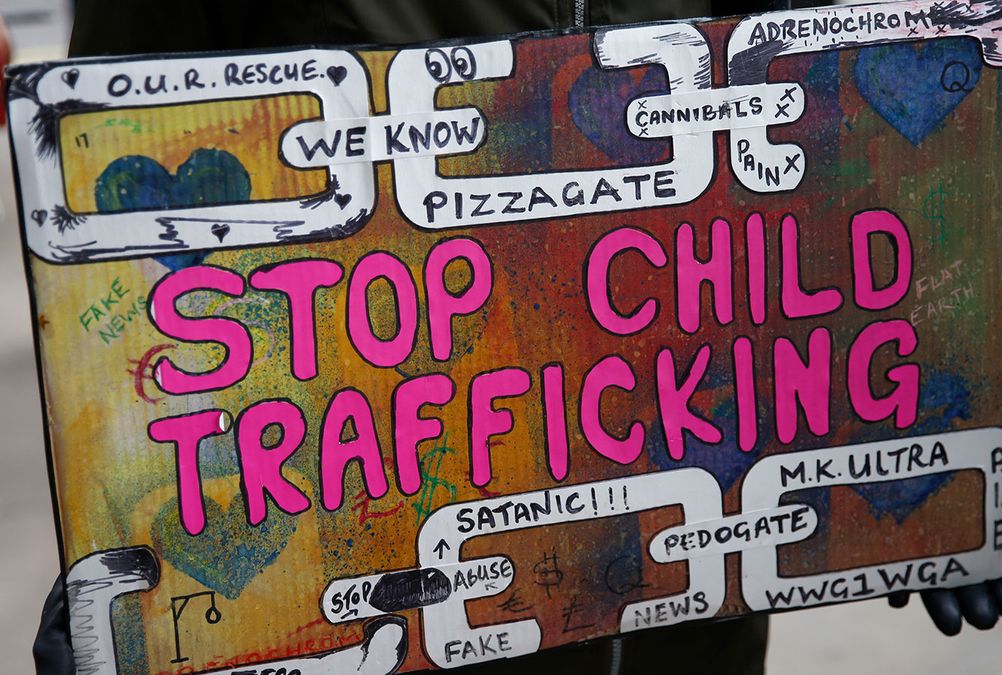
For years, it festered as simply considered one of numerous internet-fueled conspiracy theories. However in 2020, a loosely organized right-wing group known as QAnon gained main headlines because it attracted an ever-larger viewers in America and all over the world.
QAnon purports that satanic pedophiles function a worldwide youngster sex-trafficking ring, and in addition labor to usurp their hero, Donald Trump, who’s main the battle in opposition to them, in keeping with The Wall Avenue Journal. They consider that elitist Democrats (particularly Hillary Clinton and Hollywood stars) are among the many worst offenders, and that they is likely to be lizard folks disguised in human costumes. The group eagerly anticipates "The Storm," their code phrase for the day that Trump will provoke mass arrests of anybody concerned within the cabal.
To be clear, there’s completely no fact to any of those claims. But, more and more extra individuals are falling down the QAnon rabbit gap, eagerly awaiting on-line "Q drops" (data leaks) on Twitter from "Q," the one who says that she or he has inside data relating to this secret battle.
Some QAnon followers get so wrapped up within the conspiracy theories that they exhibit indicators of habit – neglecting private {and professional} duties as they obsess concerning the destiny of fictional abused kids. Many are sure that they are aware about advanced, labeled data that only some choose folks – like them — actually perceive.
Why QAnon? Why Now?
QAnon has dug itself so deeply into some peoples’ psyches that some say it is extra like a cult. "Folks within the QAnon neighborhood revere Trump, nearly on a non secular degree," stated Travis View, the host of the QAnon Nameless podcast, in keeping with The Millennial Supply. He added that he did not know anybody "deeply into QAnon" who had come out of it.
In line with a minimum of one ballot, greater than half of Republicans suppose QAnon is a minimum of partly true. Why would anybody consider such outlandish claims from an nameless poster on the web? It does not assist that some congressional candidates and even President Trump have embraced the group. However there’s extra to it than that.
"Folks may be drawn to conspiracy theories for a variety of causes," emails Christopher Dwyer, a researcher and lecturer within the College of Psychology on the Nationwide College of Eire, Galway. "I feel the broadest motive that is price mentioning is that folks like their ‘world’ to make sense; nevertheless, generally issues do not make sense and that is problematic for the thinker."
“”
QAnon supporters attend a Trump rally hosted by Lengthy Island and New York Metropolis police unions in help of the police on Oct. 4, 2020, in Suffolk County, New York.
Andrew Lichtenstein/Corbis through Getty Photos
QAnon will not be the primary conspiracy idea that has drawn folks collectively. There are people who consider the Earth is flat; the moon landings had been faked; that the U.S. authorities knew concerning the 9/11 assaults upfront. Folks of all races, genders and political opinions can maintain conspiracy theories, albeit differing ones. Spending time sifting by way of web posts and photos and speaking to like-minded people on social media can present camaraderie and a way of goal. And sure kinds of individuals are extra inclined to such displays.
"There is a lengthy listing of ‘cognitive quirks’ related to perception in conspiracy theories that features wants for closure, management, certainty, want for uniqueness, ‘bulls—- receptivity’ and lack of analytical considering, teleological bias (the necessity to attribute occasions to the next goal) and different ‘attributional’ biases, and even paranoia," says Joseph M. Pierre, M.D., psychiatry professor on the David Geffen College of Drugs at UCLA, in an electronic mail interview.
All of us have these quirks, he says, however they’re extra apparent in those that immerse themselves in conspiracy theories.
"And simply which of those quirks, or combos of quirks, may finest clarify a selected particular person’s perception in a selected conspiracy most likely varies on a case by case foundation," he says. "For instance, wants for management, certainty, and closure could also be significantly related to ‘disaster occasions’ such because the deaths of JFK or 9/11."
It is simple for many individuals to scoff at unfounded 4chan fodder like QAnon. However Pierre is fast to level out that about half the U.S. inhabitants believes in a minimum of one conspiracy idea. We have to perceive that society performs a job on this downside.
"One other extra generalizing manner of viewing perception in conspiracy theories is that it’s based mostly on (1) distrust in authoritative sources of knowledge which ends up in (2) vulnerability to misinformation within the type of conspiracy theories that current a direct counter-narrative to official accounts," he says.
Conspiracy Theories and ‘Laziness’
There’s additionally one other doable motive.
"To know why this occurs, one wants to know that people are cognitively lazy," says Dwyer. "Our brains have developed to preserve vitality; so, they do not very very similar to expending an excessive amount of when a choice may be made that is ‘ok.’ We like issues easy and wrapped up in good, neat, little packages.
"One other manner of taking a look at it’s by way of contemplating the foundational motive for why somebody may need to consider a conspiracy idea, as it would clarify away unfavourable occasions, failures or uncertainties they’ve skilled – primarily serving as a coping mechanism that gives reassurance for many who may really feel they lack the ‘management’ they need of their lives and, maybe giving them a scapegoat!"
Pierre provides that mentally wholesome folks maintain their beliefs with a great measure of "cognitive flexibility," understanding that people merely cannot be sure of the numerous advanced occasions occurring round them. Cognitive rigidity, however, may cause points.
"We are inclined to get into hassle in our social relationships once we maintain beliefs – particularly people who require religion versus proof to help conviction – with rigidity, not acknowledging that we is likely to be improper or that others with opposing views is likely to be right," he says.
Getting Assist for Conspiracy Principle Habit
If somebody is trapped inside conspiratorial considering, what may be carried out? The very first thing to know is just believing a conspiracy idea does not imply you are in want of psychological assist.
"I am certain everybody has a minimum of one perception that is not supported by proof, but we progress alongside in life as if it is reality," says Dwyer.
“”
Conspiracy theorists come from all races, genders and nationalities and have all types of beliefs. Right here, a gaggle in New Zealand protests in opposition to coronavirus restrictions, claiming Invoice Gates orchestrated the virus for his personal revenue.
Lynn Grieveson – Newsroom through Getty Photos
"Conspiracy theories aren’t the identical as delusions and there is actually no good proof that they characterize psychological sickness per se," says Pierre. "Delusions which are signs of psychological sickness are usually unshared beliefs which are based mostly on subjective expertise, whereas conspiracy theories are shared beliefs based mostly on data that’s ‘on the market.’"
However he provides that if we consider conspiracy idea perception as an issue of extreme conviction or preoccupation, we are able to borrow from the therapy of behavioral addictions that assist folks step away and unplug. That course of, although, requires some willingness and motivation to take action.
"We would lower conspiracy perception by instructing analytic considering and serving to folks grow to be higher shoppers of knowledge, particularly on-line," he says. "However we additionally should take steps as a society and as establishments of authority to regain belief and to fight misinformation inside on-line areas. Proper now, we’re shedding the misinformation battle."
One of many issues with attempting to assist somebody with an habit to conspiracy theories is that attempting to argue them out of a perception (or worse, making use of ridicule to it) solely serves to deepen dedication to these beliefs.
One 2019 research did discover that one solution to lower perception in a conspiracy idea was to concentrate on somebody’s private company. (So as an illustration, in the midst of a well being disaster, giving out steps on how people may keep wholesome ought to ideally foster much less curiosity in a conspiracy idea for a way the illness unfold, versus a authorities saying, "To not fear; we have got this lined.")
Taking that to a private degree, somebody hooked on conspiracy theories might discover that working with a counselor on private objectives, thus growing their private empowerment, may assist them grow to be much less all in favour of conspiracy theories, in keeping with the Habit Middle, a referral service for treating varied addictions.
Pierre notes that conspiracy theories are longstanding instruments of political propaganda, used to obscure details and shift accountability onto different scapegoated teams of individuals. "That is particularly related within the U.S. and the remainder of the world at the moment the place populist actions are more and more turning away from ‘elites’ as a supply of information and informational authority. We see that performed out now inside political debates over scientific points like local weather change or COVID," he says.
Now That is Fascinating
Is somebody you already know deep into QAnon? If you happen to’re seeking to vent or want help, you may join with members of QAnonCasualties on Reddit. There, you may examine how QAnon is tearing households aside and really feel rather less alone in your battle. In case your loved-one is prepared to speak to you, you need to use a variety of logical steps to stroll them by way of their thought processes, which can be sufficient to trigger an epiphany.






















